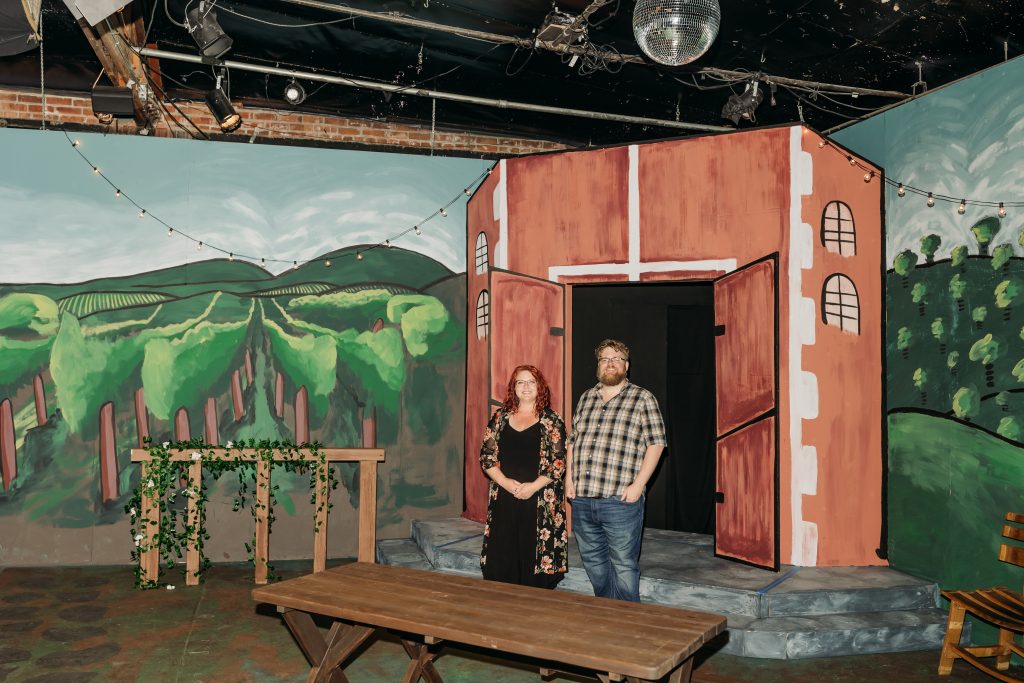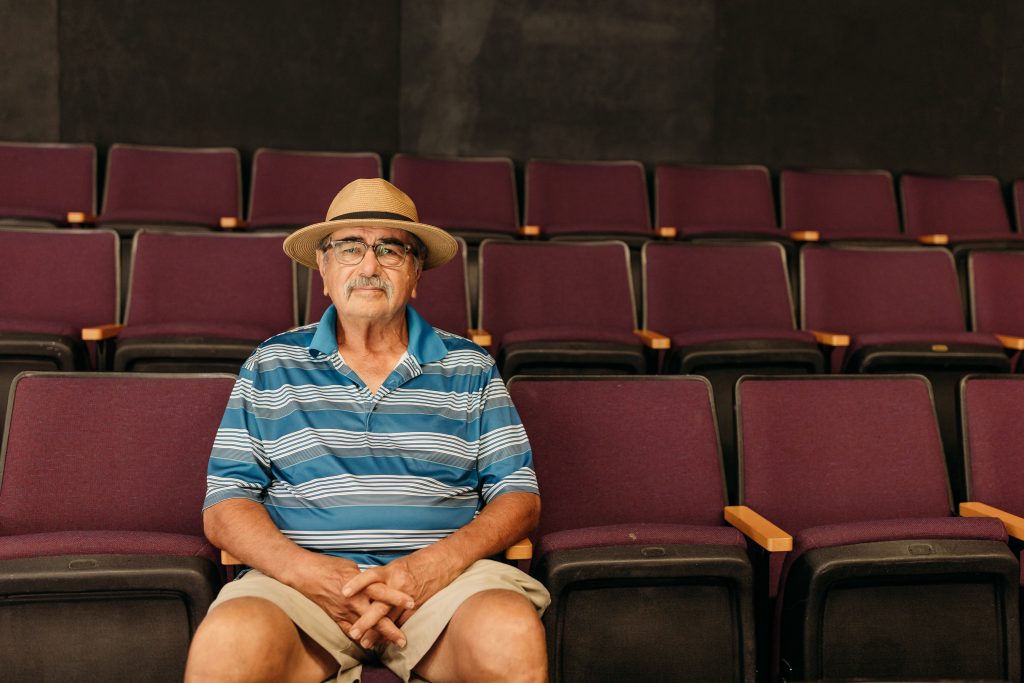By Patti Roberts
Local performing arts companies have always faced challenges in attracting audiences, choosing relatable shows and managing finances. In recent years, they’ve also had to deal with long pandemic shutdowns, an aging audience, limited media coverage and competition from at-home streaming platforms.
While most larger theater companies in Sacramento have managed to navigate some of the obstacles, smaller community theater companies face the same challenges while also not having major sponsors, donors and season ticket holders to help cover expenses. In addition, they’re seeing increasing facility rental costs and often no full-time staff who can help with the various responsibilities required to keep their theater doors open.
Big Idea Theatre on Del Paso Boulevard in Sacramento, self-described as “inclusive, daring, and bold,” was fortunate to have flexible landlords who offered reduced rents during the pandemic.
“COVID prevented us from producing theater for 19 months,” said David J. Fox, Big Idea’s co-managing director. “Local actors were out of a job, and we had to spend all our resources figuring out how to keep our company afloat without being able to produce live theater. The closures drained all our savings and put us in a mountain of debt. Four years later, we are only beginning to break even again.”
Big Idea Theatre’s landlord was willing to work with them, since they’ve been there since 2007, and COVID relief funds helped to close the financial gap. But it’s still not easy running the theater.
“Our biggest challenges are a lack of staff, a lack of time, and a lack of resources,” Fox said. “Getting word out about our shows is the mother of all challenges we face. We also don’t rely on season subscribers. We have found that people want more flexibility in choosing the shows they want to see.”

Big Idea has seen a decline in audiences, and is about 60% of where they were before the pandemic in terms of attendance.
“Trends were already happening before 2020 and the pandemic just accelerated it all,” Fox said. “Media coverage is a big thing. Ten years ago, we would see a huge jump in our ticket sales after a review was published in a local paper. That tapered off over the years as readership of local papers dropped off, and after 2020, local publications don’t even review community theater anymore.”
For Green Valley Theatre Company, known for producing innovative musicals, cabarets and lesser-known works they describe as “funky, offbeat, lowbrow British theater humor,” as well as their annual Rocky Horror Shows, rent has proven to be quite the obstacle.
From 2012 to 2018, Green Valley was located on V Street near Stockton Boulevard, but once their lease was up, they were out of that location, and they’ve been searching for a permanent home ever since then. They were able to weather the pandemic closures relatively well because they didn’t have to pay rent on a physical location, but now they’re doing the equivalent of location couch surfing.
“Finding a permanent facility is the number one need we have in producing shows as we did before,” said Artistic Director Christopher Cook. Currently, Green Valley produces musical cabarets at St. John’s Lutheran Church and productions at CalCap Blackbox Theatre in Rancho Cordova. But they are searching for a forever home.
“We can’t afford to have our theater at the current rates,” said Cook. “We’re priced out of nearly every venue that does event rentals — they charge very high rates and only want one night or one weekend events, and we need more lengthy availability. We need space not only for the run of a show, but also for rehearsals, set design construction, storage and production runs.”

Cook also echoes the challenge of reaching potential audience members as well as getting people to return to in-person live theater productions. “It’s become more challenging to reach potential audience members,” Cook said. “The social media strategies we had begun to rely on are not working anymore.”
Cook also said that during the pandemic, people became very comfortable staying at home, watching streaming services and ordering food to their door: “We’ve got to convince folks now [that] they should venture back.”
But he’s most hopeful because their current shows in smaller spaces are selling out. “Honestly, the future of small theater companies is exceedingly bright. As a smaller group, we’re able to explore storytelling in unique and exciting ways,” Cook said. “When smaller companies lean into their strengths instead of trying to mount shows that are more suited to big, equity houses, then there is a grand opportunity for experimentation, creative endeavor and amplifying often unheard voices within our community.”
A community of small theaters has found a home at the R25 Arts Complex, located at 25th and R Streets that houses three separate theater spaces: California Stage Theatre, Dennis Wilkerson Theater and Three Penny Theater.
Ray Tatar, the artistic director at California Stage, has owned and operated R25 for the last 25 years, with a mission to keep rents low and enthusiasm high for local community theater companies. “I love supporting theater, especially those that challenge our thinking,” he said.
Currently, Tatar helps seven small community theater groups stage productions at his facilities, including Teatro Espejo and Resurrection Theatre.
“Ray opened doors for our company and has kept them open,” said Manuel José Pickett, Teatro Espejo’s artistic director. “He’s flexible with our rent and he has a real connection with theaters. If it wasn’t for Ray, we wouldn’t exist. The challenge for small companies is the lack of affordable space.”

Teatro Espejo was founded in 1975 as a Latino community theater company, and in 2012, became a nonprofit producing three main shows and a one-act festival each year, along with spoken word and poetry evenings.
“We’re a Chicanx/Latinx theater company that not only does plays that are culturally relevant but that also reflect issues that affect the community as a whole,” Pickett said. “COVID greatly affected our work as a community theater company. We were forced to stream our productions online, which was difficult and not as effective as live theater.”
Pickett also cites the issues brought up by other theaters as challenges they are facing: an aging audience, the hardship of marketing productions and funding. He said just breaking even is “doing well,” but they make sure everyone gets paid.
“We’ve been fortunate, but there is not enough money out there to help sustain local theater companies,” Pickett said. “Sponsors and local funding sources have run dry and are rare. Theaters of color also face much discrimination and sometimes miss possible funding opportunities because of their unique positions.”
Though Pickett has seen a significant decline in older audience members due to health and mobility challenges, he remains hopeful. “All of our recent shows have been well attended with many returning audiences. There is a sense of community with live theater. Theater [is] stories that represent culture, history, language and community.”
Resurrection Theatre says Tatar’s low rent generosity has allowed the company to “rent for the length of production including rehearsal, set building, and the run of the show,” according to Margaret Morneau, the theater’s producer. “If we lost our space today, we would probably close because we can’t afford the rent elsewhere. Smaller theaters need people like Ray, who just love the arts and want them to thrive.”
Morneau said though she sees more senior members coming to the shows, they also see young people attending because they’ve been able to keep their ticket prices low.
Although Resurrection Theatre does have a couple of regular donors, their goal is to work within their means and budget appropriately, Morneau said. With their current show “A Midsummer Night’s Dream,” which has a 23-member cast, the company upcycled the set and used thrift store-bought items, and are using costumes borrowed from Sacramento Theatre Company.
“That’s how we have done theater for the last 14 years: Use what we have, find what we can afford and be inventive,” she said.
Resurrection Theatre averages four to five shows a year, though they did experience darkened stages for a couple years due to COVID, people have started coming back, Morneau said. “We think it’s because we always foster a sense of community and family in our work.”
This story was funded by the City of Sacramento’s Arts and Creative Economy Journalism Grant to Solving Sacramento. Following our journalism code of ethics and protocols, the city had no editorial influence over this story and no city official reviewed this story before it was published. Our partners include California Groundbreakers, Capital Public Radio, Outword, Russian America Media, Sacramento Business Journal, Sacramento News & Review, Sacramento Observer and Univision 19.





Be the first to comment on "Sacramento’s community theaters strive to keep their seats filled — and see signs of progress"